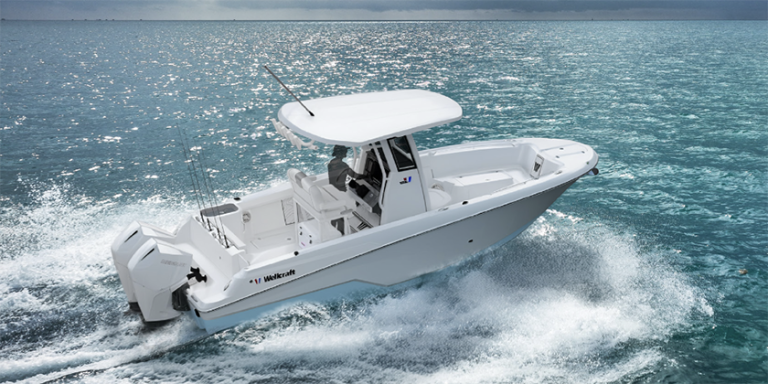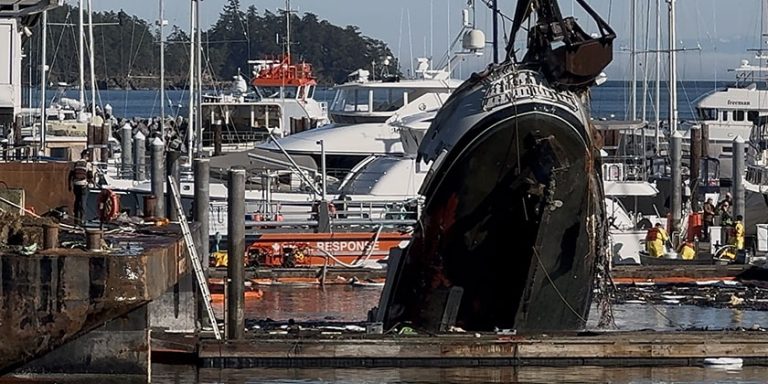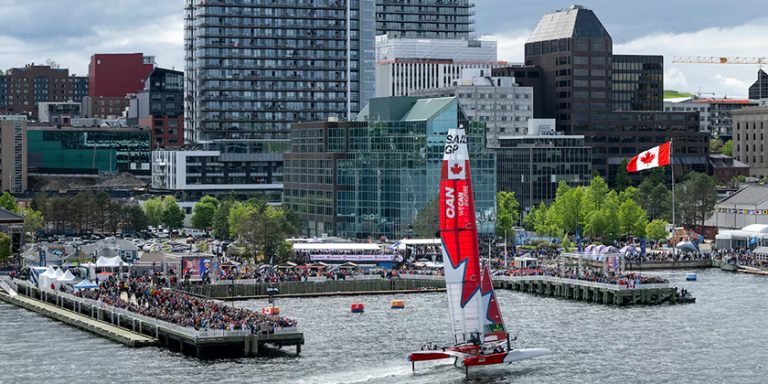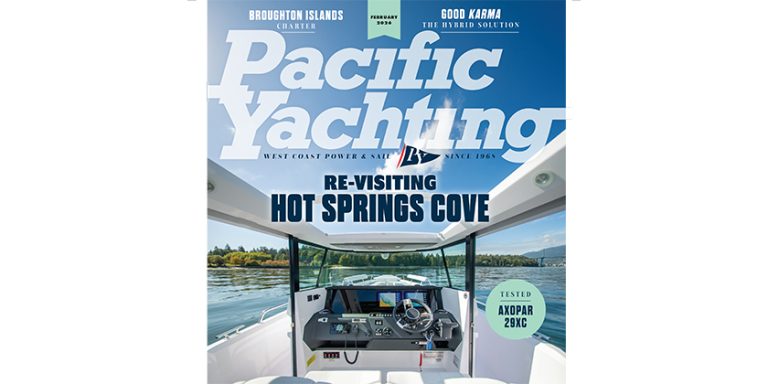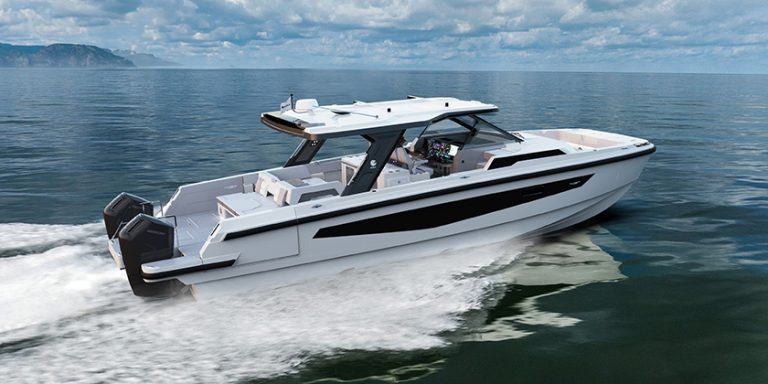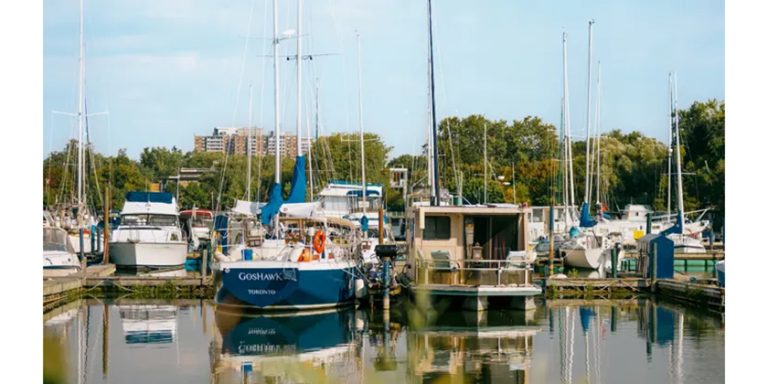Eight Bells: Donald MacKenzie Green, 86: Canadian Sailing Icon
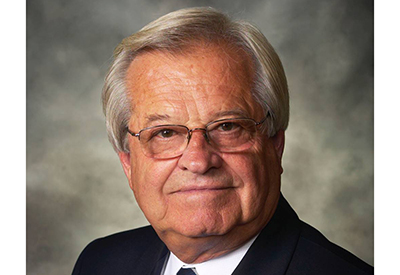
Feb 26, 2019
Donald M. Green, one of Canada’s most successful offshore sailors and a key figure in its America’s Cup campaigns of the 1980s, passed away Feb. 18, 2019 at the age of 86.
An inductee in the Canadian Sailing Hall of Fame (August 2018), Don was the recipient of many civic distinctions including Member of the Order of Canada (1980), the nation’s most significant civilian honour. “As well as being extremely active in community endeavours,” the office of the Governor-General noted of his membership, “he has brought honour to the country as a yachtsman, winning the Canada’s Cup in 1978 with his racing yacht Evergreen.”
EARLY YEARS
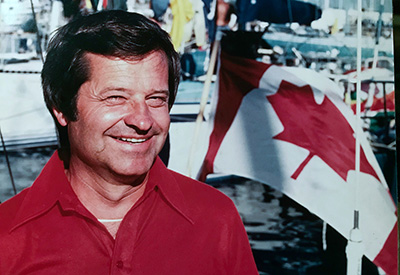 Born in Hamilton, Ontario in 1932, Don grew up sailing at the Royal Hamilton Yacht Club (RHYC). In 1950, while in his teens, Don sailed around the world on Irving Johnson’s 96-foot brigantine Yankee and published a book on his experiences, White Wings Around the World. Later graduating from Ryerson Polytechnic University with a degree in mechanical engineering, he enjoyed business success as Chairman and CEO of Tridon, an auto-parts company headquartered in Burlington, Ontario, where he made his home.
Born in Hamilton, Ontario in 1932, Don grew up sailing at the Royal Hamilton Yacht Club (RHYC). In 1950, while in his teens, Don sailed around the world on Irving Johnson’s 96-foot brigantine Yankee and published a book on his experiences, White Wings Around the World. Later graduating from Ryerson Polytechnic University with a degree in mechanical engineering, he enjoyed business success as Chairman and CEO of Tridon, an auto-parts company headquartered in Burlington, Ontario, where he made his home.
Don developed a passion for racing sailboats when his son, Steve and daughter Sharon – junior sailors at RHYC – convinced him to race his cruising boat, the C&C 35 Motivation, in local keelboat races. With all Juniors onboard, Don and his ‘Motivation Super Crew’ went on to compete triumphantly throughout Lake Ontario. Bit by the sailing bug, he went on to challenge for the 1978 Canada’s Cup: the match race competition between Canadian and American yacht clubs on the Great Lakes.
CANADA’S CUP AND EVERGREEN
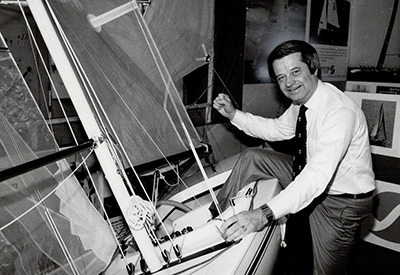 The Canada’s Cup had been contested since 1896, but no Canadian club other than Toronto’s Royal Canadian Yacht Club (RCYC) had participated. In 1978, when Don launched his campaign, the trophy had been held by Bayview Yacht Club (BYC) of Detroit since 1972, after a successful defense against an RCYC challenge in 1975. Don approached C&C Yachts of Oakville, Ontario, to design and build his challenger, christened Evergreen. As in the previous series, the contest would be held in IOR Two Tonners, approximately 41-foot. He gave the design department carte blanche to come up with a yacht that could win a match-race competition in the predominantly light winds of Lake St. Clair. Many of her innovative features would soon be outlawed or made prohibitive by changes to IOR, which made Evergreen one of the most technically advanced keelboats of its time.
The Canada’s Cup had been contested since 1896, but no Canadian club other than Toronto’s Royal Canadian Yacht Club (RCYC) had participated. In 1978, when Don launched his campaign, the trophy had been held by Bayview Yacht Club (BYC) of Detroit since 1972, after a successful defense against an RCYC challenge in 1975. Don approached C&C Yachts of Oakville, Ontario, to design and build his challenger, christened Evergreen. As in the previous series, the contest would be held in IOR Two Tonners, approximately 41-foot. He gave the design department carte blanche to come up with a yacht that could win a match-race competition in the predominantly light winds of Lake St. Clair. Many of her innovative features would soon be outlawed or made prohibitive by changes to IOR, which made Evergreen one of the most technically advanced keelboats of its time.
A young design team led by Rob Ball, along with Steve Killing and Rob Mazza, responded with a radical design with a gybing daggerboard and tiller steering. Green recruited Californian Lowell North of North Sails as well, as crew and sailmaker, introducing one of the earliest Mylar sails in keelboat competition: a “garbage bag green” genoa. Killing also served as bowman and C&C project manager, while John Fitzpatrick was on board as mainsheet trimmer. The crew otherwise was comprised of club sailors from Hamilton, including a young Allan Megarry; who occasionally sparred off Don at the helm and would go on to compete in two Canadian America’s Cup programs.
The Evergreen program also launched the career of Don’s then-teenage daughter Sharon, whose job as team photographer burgeoned into a lifelong vocation, becoming one of the world’s leading yachting photographers.
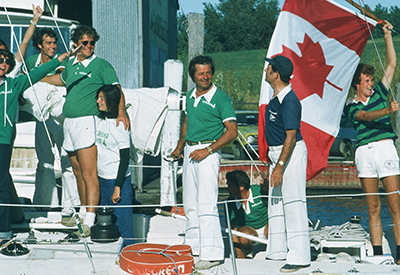 Unique to this high level of Canada’s Cup competition was Don’s position as skipper and helmsman, in addition to owner; accepting the challenge of steering a complex design in a match race rivalry that drew the sport’s most elite contenders. To reach the finals, Evergreen first had to win the Canadian challenge trials against two RCYC contenders. One was Mia VI, a new Scott Kaufmann daggerboarder owned by Paul Phelan and helmed by Olympian and sailmaker Hans Fogh. The other was a veteran German Frers design, Impetus. Evergreen prevailed convincingly over both.
Unique to this high level of Canada’s Cup competition was Don’s position as skipper and helmsman, in addition to owner; accepting the challenge of steering a complex design in a match race rivalry that drew the sport’s most elite contenders. To reach the finals, Evergreen first had to win the Canadian challenge trials against two RCYC contenders. One was Mia VI, a new Scott Kaufmann daggerboarder owned by Paul Phelan and helmed by Olympian and sailmaker Hans Fogh. The other was a veteran German Frers design, Impetus. Evergreen prevailed convincingly over both.
In the September 1978 finals, Don and Evergreen faced Agape, a new Ron Holland design that had been converted during the American selection trials from a daggerboard to a fixed keel. The points-based series awarded one point for course wins, one point for its middle-distance race, and two points for the long-distance race. Evergreen won the first two course races, to go up 2-0; then had to retire from the middle-distance race when a grounding tore off the lead shoe of the daggerboard. Then, while leading the long-distance race, Evergreen’s chainplate broke, causing her to dismast. Now behind 3-2, Don would have to win two back-to-back course races to secure the trophy, which he did: in an at-times acrimonious conclusion to the series. BYC officials had a hard time believing Don was actually steering Evergreen, and monitored closely to be sure American tactician Tim Stearn never had a hand on the tiller, in contravention of the nationality regulations of the contest.
Back home in Hamilton, Don served as Commodore of RHYC in 1978 to 1979, and went on to compete as part of Canada’s 1979 Admiral’s Cup team, again as skipper of Evergreen. Changes to the IOR designed to discourage further daggerboard designs required Evergreen to be converted to a fixed keel. That year, the Fastnet Race in segment of the Admiral’s Cup series was marred by a storm that claimed the lives of 15 competitors. While Evergreen did not complete the course, Don brought Evergreen and crew safely back to harbour from the carnage in the Irish Sea.
After the 1979 Admiral’s Cup, Don sold Evergreen, and campaigned Evergreen II, a 45-foot German Frers design, very successfully offshore.
AMERICA’S CUP AMBITIONS
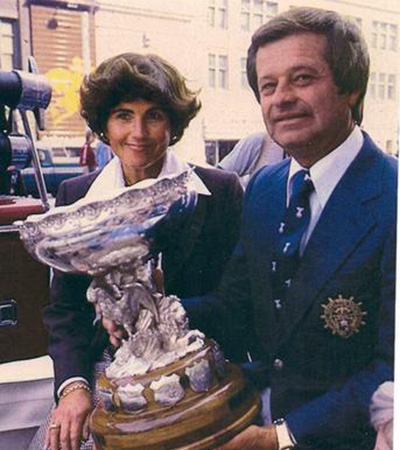 In 1982, Don was brought into the Canada 1 challenge for the 1983 America’s Cup, as an advisor. Around this time, he had become involved in the sailmaking industry, playing a role in bringing Hans Fogh and his Toronto loft into the North Sails system, and serving as a Director of North Sails Fogh Ltd.
In 1982, Don was brought into the Canada 1 challenge for the 1983 America’s Cup, as an advisor. Around this time, he had become involved in the sailmaking industry, playing a role in bringing Hans Fogh and his Toronto loft into the North Sails system, and serving as a Director of North Sails Fogh Ltd.
Canada 1, designed by Bruce Kirby and Steve Killing, reached the semi-finals of the challengers’ trials. Then, after Australia II’s victory in 1983, Don mounted one of two Canadian challenges for the 1987 series in Perth. The True North syndicate secured Steve Killing as designer, Jeff Boyd (tactician of Canada 1) as skipper, and Terry McLaughlin (skipper of Canada 1) and Hans Fogh as helmsmen. A two-boat program was launched. True North I finished sixth in the 1986 12 Metre Worlds in Perth. A lack of sponsorship funding forced construction of True North II to come to a halt, and Canada’s two challenge programs merged. Canada II, a revamped Canada 1, was chosen as the Canadian challenger: the first Canadian contender in over 100 years.
INDUSTRIALIST, ENTREPRENEUR AND ALLY
![]() Don was an outstanding competitive sailor with a strong commitment – both on and off the water – to technology and scientific research as foundations of competitive advantage. He served as Chair of Innovation Ontario Corporation from 1986 to 1982, and as Governor of Ortech, the Ontario Research Corporation, from 1974 to 1984. In addition to a wide number of corporate directorships, Don gave generously of his time to public service, including serving as Governor of the Olympic Trust of Canada; President of the Greater Hamilton YMCA; Founding Chair of the Hamilton District Health Council; Chair of Hamilton Civil Hospitals and its School of Nursing; Director of the Canadian National Sportsmen’s Shows; Director of the Canadian Chamber of Commerce; and Chair of the Board of Governors of McMaster University, from which he received an honorary Doctorate of Law degree in 2008.
Don was an outstanding competitive sailor with a strong commitment – both on and off the water – to technology and scientific research as foundations of competitive advantage. He served as Chair of Innovation Ontario Corporation from 1986 to 1982, and as Governor of Ortech, the Ontario Research Corporation, from 1974 to 1984. In addition to a wide number of corporate directorships, Don gave generously of his time to public service, including serving as Governor of the Olympic Trust of Canada; President of the Greater Hamilton YMCA; Founding Chair of the Hamilton District Health Council; Chair of Hamilton Civil Hospitals and its School of Nursing; Director of the Canadian National Sportsmen’s Shows; Director of the Canadian Chamber of Commerce; and Chair of the Board of Governors of McMaster University, from which he received an honorary Doctorate of Law degree in 2008.
Don is survived by Sandy, his loving wife of 61 years; son Stephen and daughter Sharon; daughter-in-law Christine; and grandchildren Michaela, Kieran, Michael and Rachel. He will also be mourned by his best friend, ‘partner in crime’ and sailing buddy John Bobyk of Orillia, Ontario, and many others in the boating and local community.
A celebration of life will be announced in the coming weeks.

